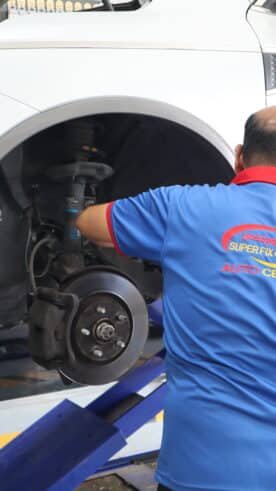Signs of Brake Issues: When to Seek Professional Help
Why Brake Maintenance is Critical
- Safety: Your brakes are the most important safety feature on your vehicle. Properly functioning brakes ensure that you can stop quickly and effectively in any situation, reducing the risk of accidents.
- Preventing Costly Repairs: Addressing brake issues early can prevent more extensive and expensive damage to your braking system and other car components.
- Maintaining Performance: Healthy brakes contribute to better overall vehicle performance, providing you with a smoother and more controlled driving experience.
Common Signs of Brake Issues
- Squealing or Grinding Noises:
- What it Means: Squealing noises often indicate that your brake pads are worn down and need replacement. If you hear grinding, it could mean that the brake pads are completely worn out, allowing metal-to-metal contact between the rotor and caliper, which can cause significant damage.
- When to Seek Help: If you hear consistent squealing or grinding, it’s time to visit a mechanic. Ignoring these sounds can lead to more serious (and expensive) repairs.
- Soft or Spongy Brake Pedal:
- What it Means: A soft or spongy brake pedal, where the pedal feels unusually easy to press down, could indicate air in the brake lines, low brake fluid, or a problem with the master cylinder.
- When to Seek Help: If your brake pedal feels soft or spongy, it’s important to get your brakes checked immediately. This issue can severely compromise your ability to stop your vehicle.
- Vibration or Pulsing When Braking:
- What it Means: If you feel a vibration or pulsing sensation in the brake pedal or steering wheel when braking, it could be due to warped brake rotors. This can happen from excessive heat, often caused by heavy braking or worn-out pads.
- When to Seek Help: Vibration during braking is a clear sign that your rotors may need resurfacing or replacement. It’s best to address this issue promptly to maintain safe braking performance.
- Brake Warning Light:
- What it Means: If the brake warning light on your dashboard lights up, it could indicate a range of issues, from low brake fluid levels to problems with the brake system itself.
- When to Seek Help: Don’t ignore the brake warning light. Even if your brakes seem to be working fine, it’s essential to have a professional inspect the system to identify any underlying issues.
- Pulling to One Side When Braking:
- What it Means: If your car pulls to one side when you brake, it could be a sign of uneven brake pad wear, a stuck caliper, or issues with your brake fluid.
- When to Seek Help: Pulling to one side can make it difficult to control your vehicle during braking. Have this issue checked by a mechanic as soon as possible.
- Burning Smell While Driving:
- What it Means: A burning smell after heavy braking could indicate overheated brakes or, worse, a stuck caliper. This smell often accompanies smoke from the wheel area.
- When to Seek Help: If you notice a burning smell, especially if accompanied by smoke, pull over safely and let your brakes cool down. If the smell persists, have your vehicle inspected immediately.
Comparing Minor Issues vs. Serious Problems
- Minor Issues:
- Squealing brakes due to dust or temporary moisture can sometimes resolve on their own.
- A slight vibration may be due to uneven pad wear and can be addressed with a simple pad replacement.
- Serious Problems:
- Grinding noises, a soft brake pedal, or the brake warning light should never be ignored, as they indicate more serious issues that require immediate attention.
- Consistent pulling to one side, severe vibrations, or any burning smell are signs of potentially dangerous brake failure and should be addressed by a professional without delay.
Regular Brake Maintenance Tips
- Check Brake Pads and Rotors Regularly: Have your brake pads and rotors inspected during routine maintenance to ensure they’re in good condition.
- Monitor Brake Fluid Levels: Regularly check your brake fluid level and top it up as necessary. If you frequently need to add brake fluid, have your brake system inspected for leaks.
- Listen and Feel for Changes: Pay attention to any changes in how your brakes sound or feel. Early detection of issues can prevent more serious problems.
Conclusion
Your brakes are crucial to your vehicle’s safety and performance. By staying alert to the signs of brake issues and seeking professional help when needed, you can ensure that your brakes remain in top condition, keeping you and your passengers safe on the road. Regular maintenance and prompt attention to warning signs are key to avoiding costly repairs and potential accidents.






